Managing multiple credit cards can seem overwhelming, but with the right strategies, you can use them responsibly and even benefit from rewards, lower interest rates, and improved credit scores. Many people in Pakistan have multiple credit cards for various reasons, such as earning rewards, managing different types of expenses, or simply for convenience. However, without careful management, having multiple credit cards can lead to financial strain. This guide explains how to effectively manage multiple credit cards.
| Tip | Benefit |
|---|---|
| Pay Bills on Time | Avoids late fees and protects credit score. |
| Track Spending | Helps avoid overspending and debt. |
| Use Rewards Wisely | Maximizes benefits without extra costs. |
| Keep Credit Utilization Low | Maintains a good credit score. |
Pay Bills on Time
One of the most important aspects of managing multiple credit cards is paying your bills on time. Late payments can result in penalties, higher interest rates, and a negative impact on your credit score. In Pakistan, most credit card companies charge hefty late fees and add interest to overdue balances. To ensure you never miss a payment, set up reminders or automatic bill payments through your bank. Paying on time will help you maintain a healthy credit history and avoid unnecessary financial strain.
Track Your Spending
When you have multiple credit cards, it can be easy to lose track of your spending. To avoid falling into debt, it’s essential to monitor your purchases regularly. Many banks in Pakistan offer mobile apps or online banking services where you can track your transactions in real-time. Set a budget for each credit card and ensure you don’t exceed it. By keeping a close eye on your spending, you can avoid surprises when your credit card bills arrive and stay within your financial limits.
Use Rewards Wisely
Credit cards often come with rewards such as cashback, travel points, and discounts. If you manage multiple cards, make sure you are using them strategically to maximize the rewards. For example, if one card offers higher cashback on groceries and another gives discounts on fuel, use the appropriate card for each type of expense. However, be careful not to overspend just to earn rewards. Remember, the goal is to use the cards for necessary purchases and not to increase your debt in the process.
Keep Credit Utilization Low
Credit utilization refers to the percentage of your available credit that you are using. High credit utilization (over 30% of your total credit limit) can negatively affect your credit score. With multiple credit cards, it’s essential to spread out your spending and keep your balances low. If one card reaches its limit, try using another card or paying off the balance before the due date to keep your credit utilization under control. Maintaining low credit utilization helps improve your credit score and shows lenders that you can manage your credit responsibly.
Avoid Accumulating Debt
Having multiple credit cards can lead to the temptation of accumulating debt, especially if you don’t manage them properly. Make sure that you are only using credit cards for essential purchases and not living beyond your means. If you find that you are unable to pay off your balances in full each month, consider consolidating your debts into one card with a lower interest rate or seeking help from a financial advisor. Avoid using credit cards for non-essential purchases and focus on paying off your outstanding balances to prevent growing debt.
Keep Track of Due Dates
Another important part of managing multiple credit cards is keeping track of each card’s due date. If you miss a payment on one card, you could incur fees or interest charges, which will increase your overall debt. Use a calendar or an app to mark the due dates for all your cards and make sure you have enough funds to cover the payments. This will help you avoid late fees and protect your credit score.
Conclusion
Managing multiple credit cards effectively requires organization, discipline, and a good understanding of how to use each card responsibly. By paying your bills on time, tracking your spending, using rewards wisely, and keeping credit utilization low, you can reap the benefits of multiple cards without falling into debt. Stay proactive in managing your cards, and remember that the key to financial health is not how many cards you have, but how you manage them.
FAQs
1. How many credit cards should I have?
The number of credit cards you should have depends on your ability to manage them responsibly. Some people find that one or two cards are enough, while others may have more. The key is to avoid overspending and paying late fees.
2. Can having multiple credit cards hurt my credit score?
If managed poorly, having multiple credit cards can hurt your credit score due to high credit utilization or missed payments. However, responsible use can actually improve your credit score by showing lenders that you can handle different forms of credit.
3. What should I do if I am struggling to pay off my credit cards?
If you’re struggling with credit card debt, consider consolidating your balances, seeking a lower interest rate, or speaking to a financial advisor for guidance. It’s important to make a plan and take action before the debt gets out of control.
